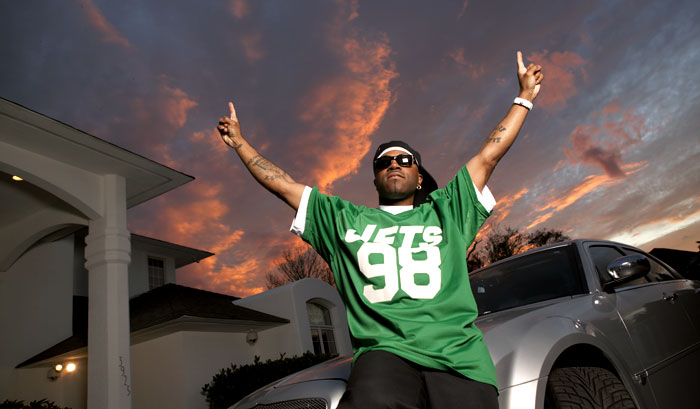


Producer, composer and singer Teddy Riley had a dramatic introduction to the music business.
"I was five years old," he says. "Gladys Knight was performing at the Apollo Theater, singing 'Neither One of Us,' and she picked me up in her arms and put me onstage with her! From that day on, my dream was to perform on that stage. And all my dreams came true."
Riley grew up surrounded by music in New York, learning to play drums, guitar and trumpet at an early age. By his teens, he was performing with two local bands--a Jacksons-style vocal group and a Top-40 band. And after meeting Kool and the Gang associate Royal Bayyan, Teddy also began tagging along to recording sessions.
The Motif has truly visionary sounds. If you want strings, trust me, the strings sound like strings.
"I used to studio-hop, from age 15 to 17, just to learn about it all," he remembers. "I became an assistant at Media Sound Studios on 57th Street. I learned everything I needed to know as an assistant, watching everybody do these incredible hits."

Riley soon connected with singers Aaron Hall and Timmy Gatling to form his first vocal supergroup, Guy. "I was working at Quantum Sounds in New Jersey, going back and forth between there and studios in Queens and Manhattan, doing production work for Keith Sweat, Heavy D, Kool Moe Dee, Bobby Brown and a bunch of other people," recalls Riley. "At first Timmy Gatling just wanted me to produce and play keys, but Aaron Hall said, 'I don't want to do this if he's not in the group.' So they made a quick decision and put me in the group."
With Guy, Teddy originated the New Jack Swing sound for which he would become famous. Guy's blend of jazz, gospel, funk and hip-hop earned the group instant fame, with hits like "Groove Me" and "Teddy's Jam." After Guy disbanded, Riley launched another group, Blackstreet, which brought even greater success with the platinum hit "No Diggity." "That was the biggest record I ever sang as an artist," he notes. "It knocked 'The Macarena' off the #1 spot on the charts!"
Meanwhile, Riley started amassing production credits. Beginning with Bobby Brown's "Don't Be Cruel" in 1988, he produced a string of hits that continues to this day, including records by Michael Jackson, Jay-Z, Mary J. Blige, the Winans, *NSYNC, and SWV. "Working with Michael Jackson really brought out the best in me," claims Riley. "It put me in the mode of 'settle for nothing less than great.' And that's the mode I've been in since then. If I can't get it great, I don't do it at all."
Riley now has his own studio complex in Virginia Beach, VA. He also tours with both the re-formed Guy and Blackstreet and is working on a joint album featuring both groups. He uses Steinberg's Nuendo digital audio software in the studio and on his PC laptop-based system, incorporated with Yamaha's mLAN technology to stream MIDI and audio data between his computer and his Motif keyboard. "And soon I'll be mLAN-based on the Motif and the Yamaha DM2000 console, with 96 channels," he adds.
"Nuendo gives me everything I could ever want for working with audio and MIDI instruments," Riley says. "I use a lot of the effects in Nuendo and in the Motif. And once I get the DM2000, that covers everything I will ever need in a mixing and engineering board. I really would love to be all Yamaha-based, even in my big room. The maintenance on the console I have now is close to $15,000 a year! I'm tired of spending that type of money and being disappointed when I could get such a great sound with the Yamaha stuff. I don't have to go out and get effects or any third-party things--it can be added into the board through the mLAN."
As a longtime fan of Yamaha synths, starting with the DX7 and DX100, Riley is especially fond of his Motif keyboards. "I have them all, but the one I like best is the ES6, the 64-key model. We use the ES8 on the road with my band, along with two ES6es. The Motif has truly visionary sounds. If you want strings, trust me, the strings sound like strings. If you want horns, they sound like horns. Every instrument in this keyboard sounds like what it is, down to the 808 kick drum."
Riley attributes his remarkable success not just to talent or luck, but to technical know-how. "You have to have the engineering skills," he insists. "I have an engineer on my sessions, but I can do it all myself if I need to. If I need a knob moved, I can tell him everything without even looking. I teach all my producers, and even the artists, how to engineer their own sessions. That's what you need to be in this crew: You need to know how to do it on your own."
























